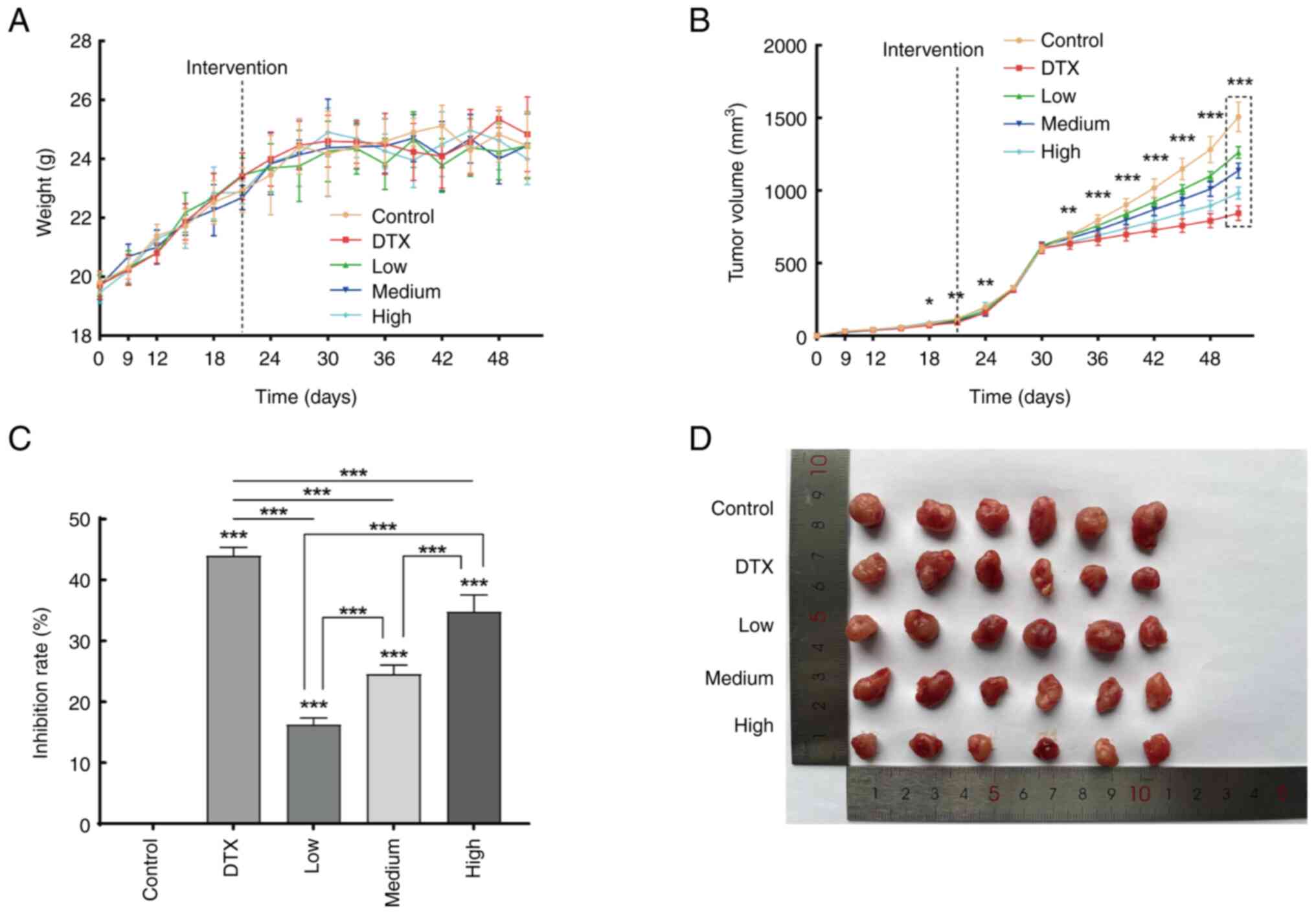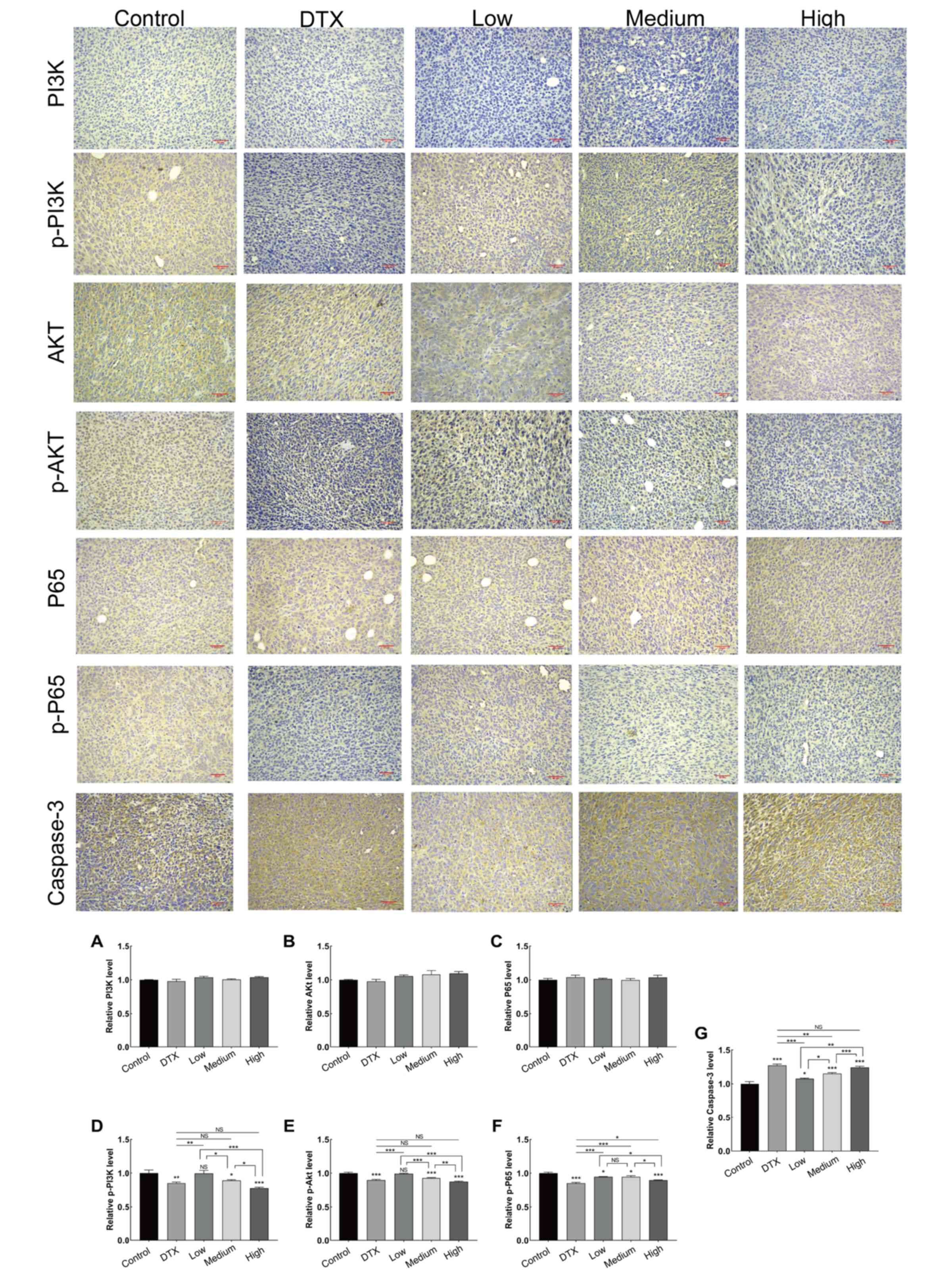|
1
|
Oczkowski M, Dziendzikowska K,
Pasternak-Winiarska A, Włodarek D and Gromadzka-Ostrowska J:
Dietary factors and prostate cancer development, progression, and
reduction. Nutrients. 13:4962021. View Article : Google Scholar : PubMed/NCBI
|
|
2
|
Bergengren O, Pekala KR, Matsoukas K,
Fainberg J, Mungovan SF, Bratt O, Bray F, Brawley O, Luckenbaugh
AN, Mucci L, et al: 2022 Update on prostate cancer epidemiology and
risk factors-A systematic review. Eur Urol. 84:191–206. 2023.
View Article : Google Scholar : PubMed/NCBI
|
|
3
|
Mumuni S, O'Donnell C and Doody O: The
risk factors and screening uptake for prostate cancer: A scoping
review. Healthcare (Basel). 11:27802023. View Article : Google Scholar : PubMed/NCBI
|
|
4
|
Chen L, Xu YX, Wang YS, Ren YY, Chen YM,
Zheng C, Xie T, Jia YJ and Zhou JL: Integrative Chinese-Western
medicine strategy to overcome docetaxel resistance in prostate
cancer. J Ethnopharmacol. 331:1182652024. View Article : Google Scholar : PubMed/NCBI
|
|
5
|
Chen XJ, Duan JF, Liu KQ, Guo YY, Wang DP,
Liu M, Zhao D, Li B, Li HL and Wang XB: Botany, traditional uses,
and pharmacology of polygonati rhizoma. Chin Med Cult. 4:251–259.
2021. View Article : Google Scholar
|
|
6
|
Shen S and Jiang S: Chinese herbal
medicines of supplementing Qi and nourishing Yin combined with
chemotherapy for non-small cell lung cancer: A meta-analysis and
systematic review. J Cell Biochem. 120:8841–8848. 2019. View Article : Google Scholar : PubMed/NCBI
|
|
7
|
Liu Z, Ni H, Yu L, Xu S, Bo R, Qiu T, Gu
P, Zhu T, He J, Wusiman A, et al: Adjuvant activities of
CTAB-modified Polygonatum sibiricum polysaccharide cubosomes
on immune responses to ovalbumin in mice. Int J Biol Macromol.
148:793–801. 2020. View Article : Google Scholar : PubMed/NCBI
|
|
8
|
Yang C, Li D, Ko CN, Wang K and Wang H:
Active ingredients of traditional Chinese medicine for enhancing
the effect of tumor immunotherapy. Front Immunol. 14:11330502023.
View Article : Google Scholar : PubMed/NCBI
|
|
9
|
Xiao X, Guo Z, Li X, Chen P, Li Y, Zhang
J, Mao C, Ji D, Su L, Gao B and Lu T: Effects of wine processed
Polygonatum polysaccharides on immunomodulatory effects and
intestinal microecology in mice. Qual Assur Saf Crops Foods.
15:61–174. 2023.
|
|
10
|
Zhang Q, Yang Z and Su W: Review of
studies on polysaccharides, lignins and small molecular compounds
from three Polygonatum Mill. (Asparagaceae) spp. in crude
and processed states. Int J Biol Macromol. 260:1295112024.
View Article : Google Scholar : PubMed/NCBI
|
|
11
|
Pan M, Wu Y, Sun C, Ma H, Ye X and Li X:
Polygonati Rhizoma: A review on the extraction, purification,
structural characterization, biosynthesis of the main secondary
metabolites and anti-aging effects. J Ethnopharmacol.
327:1180022024. View Article : Google Scholar : PubMed/NCBI
|
|
12
|
Gong H, Gan X, Li Y, Chen J, Xu Y, Shi S,
Li T, Li B, Wang H and Wang S: Review on the genus
Polygonatum polysaccharides: Extraction, purification,
structural characteristics and bioactivities. Int J Biol Macromol.
229:909–930. 2023. View Article : Google Scholar : PubMed/NCBI
|
|
13
|
Xie Y, Jiang Z, Yang R, Ye Y, Pei L, Xiong
S, Wang S, Wang L and Liu S: Polysaccharide-rich extract from
Polygonatum sibiricum protects hematopoiesis in bone marrow
suppressed by triple negative breast cancer. Biomed Pharmacother.
137:1113382021. View Article : Google Scholar : PubMed/NCBI
|
|
14
|
Han SY, Hu MH, Qi GY, Ma CX, Wang YY, Ma
FL, Tao N and Qin ZH: Polysaccharides from Polygonatum
inhibit the proliferation of prostate cancer-associated
fibroblasts. Asian Pac J Cancer Prev. 17:3829–3833. 2016.PubMed/NCBI
|
|
15
|
Gao D, Fang L, Liu C, Yang M, Yu X, Wang
L, Zhang W, Sun C and Zhuang J: Microenvironmental regulation in
tumor progression: Interactions between cancer-associated
fibroblasts and immune cells. Biomed Pharmacother. 167:1156222023.
View Article : Google Scholar : PubMed/NCBI
|
|
16
|
Siegel RL, Giaquinto AN and Jemal A:
Cancer statistics, 2024. CA Cancer J Clin. 74:12–49. 2024.
View Article : Google Scholar : PubMed/NCBI
|
|
17
|
Crucitta S, Cucchiara F, Mathijssen R,
Mateo J, Jager A, Joosse A, Passaro A, Attili I, Petrini I, van
Schaik R, et al: Treatment-driven tumour heterogeneity and drug
resistance: Lessons from solid tumours. Cancer Treat Rev.
104:1023402022. View Article : Google Scholar : PubMed/NCBI
|
|
18
|
Cussenot O, Cancel-Tassin G, Rao SR,
Woodcock DJ, Lamb AD, Mills IG and Hamdy FC: Aligning germline and
somatic mutations in prostate cancer. Are genetics changing
practice? BJU Int. 132:472–484. 2023.PubMed/NCBI
|
|
19
|
Wang K, Chen Q, Shao Y, Yin S, Liu C, Liu
Y, Wang R, Wang T, Qiu Y and Yu H: Anticancer activities of TCM and
their active components against tumor metastasis. Biomed
Pharmacother. 133:1110442021. View Article : Google Scholar : PubMed/NCBI
|
|
20
|
Zhang Y, Chen HG, Zhao C, Gong XJ and Zhou
X: Research progress on anti-hepatocellular carcinoma mechanism of
active ingredients of traditional Chinese medicine. Zhongguo Zhong
Yao Za Zhi. 45:3395–3406. 2020.(In Chinese). PubMed/NCBI
|
|
21
|
Qiang M, Cai P, Ao M, Li X, Chen Z and Yu
L: Polysaccharides from Chinese materia medica: Perspective towards
cancer management. Int J Biol Macromol. 224:496–509. 2023.
View Article : Google Scholar : PubMed/NCBI
|
|
22
|
Liu X, Xiao X, Han X, Yao L and Lan W:
Natural flavonoids alleviate glioblastoma multiforme by regulating
long non-coding RNA. Biomed Pharmacother. 161:1144772023.
View Article : Google Scholar : PubMed/NCBI
|
|
23
|
Hu J, Qiu S, Wang F, Li Q, Xiang CL, Di P,
Wu Z, Jiang R, Li J, Zeng Z, et al: Functional divergence of
CYP76AKs shapes the chemodiversity of abietane-type diterpenoids in
genus Salvia. Nat Commun. 14:46962023. View Article : Google Scholar : PubMed/NCBI
|
|
24
|
Cattivelli A, Conte A and Tagliazucchi D:
Quercetins, chlorogenic acids and their colon metabolites inhibit
colon cancer cell proliferation at physiologically relevant
concentrations. Int J Mol Sci. 24:122652023. View Article : Google Scholar : PubMed/NCBI
|
|
25
|
Wu XL, Lin SG, Mao YW, Wu JX, Hu CD, Lv R,
Zeng HD, Zhang MH, Lin LZ, Ouyang SS and Zhao YX: Wnt/β-catenin
signalling pathway in breast cancer cells and its effect on
reversing tumour drug resistance by alkaloids extracted from
traditional Chinese medicine. Expert Rev Mol Med. 25:e212023.
View Article : Google Scholar : PubMed/NCBI
|
|
26
|
Liu MQ, Bao CJ, Liang XF, Ji XY, Zhao LQ,
Yao AN, Guo S, Duan JL, Zhao M and Duan JA: Specific molecular
weight of Lycium barbarum polysaccharide for robust breast
cancer regression by repolarizing tumor-associated macrophages. Int
J Biol Macromol. 261:1296742024. View Article : Google Scholar : PubMed/NCBI
|
|
27
|
Yao Y, Zhou L, Liao W, Chen H, Du Z, Shao
C, Wang P and Ding K: HH1-1, a novel Galectin-3 inhibitor, exerts
anti-pancreatic cancer activity by blocking
Galectin-3/EGFR/AKT/FOXO3 signaling pathway. Carbohydr Polym.
204:111–123. 2019. View Article : Google Scholar : PubMed/NCBI
|
|
28
|
Li Q, Zhang C, Xu G, Shang X, Nan X, Li Y,
Liu J, Hong Y, Wang Q and Peng G: Astragalus polysaccharide
ameliorates CD8+ T cell dysfunction through
STAT3/Gal-3/LAG3 pathway in inflammation-induced colorectal cancer.
Biomed Pharmacother. 171:1161722024. View Article : Google Scholar : PubMed/NCBI
|
|
29
|
Li W, Zhou Q, Lv B, Li N, Bian X, Chen L,
Kong M, Shen Y, Zheng W, Zhang J, et al: Ganoderma lucidum
polysaccharide supplementation significantly activates
T-cell-mediated antitumor immunity and enhances anti-PD-1
immunotherapy efficacy in colorectal cancer. J Agric Food Chem.
72:12072–12082. 2024. View Article : Google Scholar : PubMed/NCBI
|
|
30
|
Lai W, Ning Q, Wang G, Gao Y, Liao S and
Tang S: Antitumor activity of Polygonatum sibiricum
polysaccharides. Arch Pharm Res. 47:696–708. 2024. View Article : Google Scholar : PubMed/NCBI
|
|
31
|
Zhao G, Zhou Y, Tang Y, Abbas M, Dong S,
Zhao X, Liu X, Wang X, Li C and Liu C: Potential antitumor effect
of polysaccharides extracted from Polygonatum sibiricum on
human prostate cancer PC-3 cells. Oncol Lett. 29:282024. View Article : Google Scholar : PubMed/NCBI
|
|
32
|
Rezaei S, Nikpanjeh N, Rezaee A, Gholami
S, Hashemipour R, Biavarz N, Yousefi F, Tashakori A, Salmani F,
Rajabi R, et al: PI3K/Akt signaling in urological cancers:
Tumorigenesis function, therapeutic potential, and therapy response
regulation. Eur J Pharmacol. 955:1759092023. View Article : Google Scholar : PubMed/NCBI
|
|
33
|
Herberts C, Murtha AJ, Fu S, Wang G,
Schönlau E, Xue H, Lin D, Gleave A, Yip S, Angeles A, et al:
Activating AKT1 and PIK3CA mutations in metastatic
castration-resistant prostate cancer. Eur Urol. 78:834–844. 2020.
View Article : Google Scholar : PubMed/NCBI
|
|
34
|
Li Q, Li Z, Luo T and Shi H: Targeting the
PI3K/AKT/mTOR and RAF/MEK/ERK pathways for cancer therapy. Mol
Biomed. 3:472022. View Article : Google Scholar : PubMed/NCBI
|
|
35
|
Hoxhaj G and Manning BD: The PI3K-AKT
network at the interface of oncogenic signalling and cancer
metabolism. Nat Rev Cancer. 20:74–88. 2020. View Article : Google Scholar : PubMed/NCBI
|
|
36
|
Zhao J, Ma L, Ni Z and Liu H: In vitro
facilitating role of Polygonatum sibiricum polysaccharide in
osteogenic differentiation of bone marrow mesenchymal stem cells
from patients with multiple myeloma. Biotechnol Lett. 43:1311–1322.
2021. View Article : Google Scholar : PubMed/NCBI
|
|
37
|
Xu Y, Guo Y, Lu C, Yu L, Fang C and Li C:
Polygonatum sibiricum polysaccharide inhibited liver cancer
in a simulated tumor microenvironment by eliminating TLR4/STAT3
pathway. Biol Pharm Bull. 46:1249–1259. 2023. View Article : Google Scholar : PubMed/NCBI
|
|
38
|
Li L, Thakur K, Cao YY, Liao BY, Zhang JG
and Wei ZJ: Anticancerous potential of polysaccharides sequentially
extracted from Polygonatum cyrtonema Hua in Human cervical
cancer Hela cells. Int J Biol Macromol. 148:843–850. 2020.
View Article : Google Scholar : PubMed/NCBI
|

















